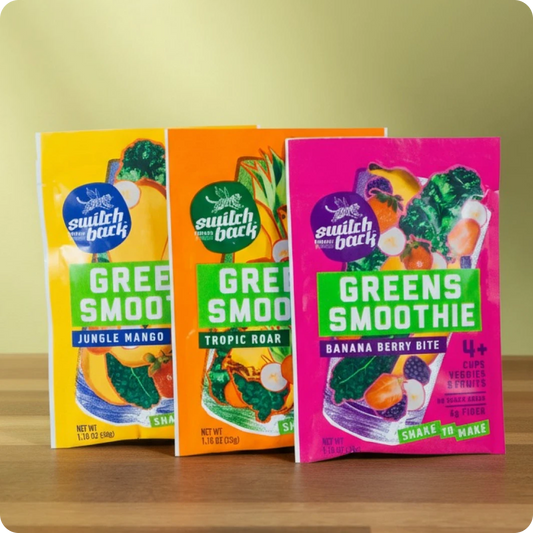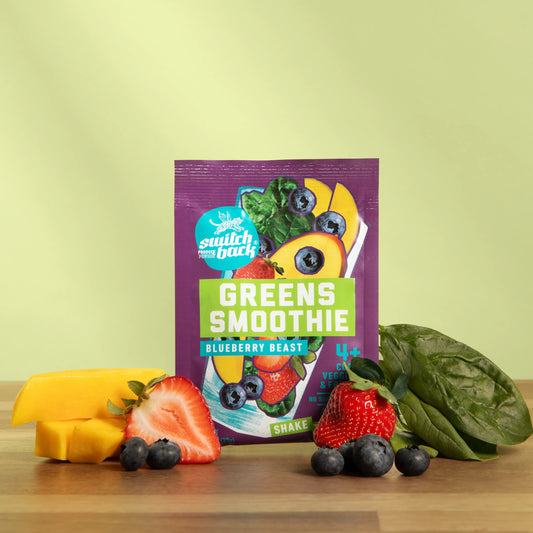
Superfoods. Fact or Fiction?
Superfoods; Fact or Fiction
What are the the top ten superfoods according to science?
Before we jump in, lets discuss some pure and utter trash. Superfoods is a highly debatable and highly contentious label. You will see it popping up on every shelf and supplement making claims. What some people claim to be superfoods can't offer any health benefits or disease prevention because of their inadequate micro nutrients. So, before you read on, just remember your green powder that has no micronutrients called out, or very little, really isn't doing anything for your body. It would be akin to eating a teaspoon of yogurt and thinking "Wow I got all my probiotics today!"
The concept of "superfoods" isn't exactly endorsed by leading health organizations but is by your top influencers who don't have education around health and nutrition. However, there are many foods that are scientifically proven to be very nutritious and beneficial for your health. Here are ten of those according to a survey of registered dietitians:
-
Fermented foods like yogurt and kimchi: These are rich in probiotics which are beneficial for gut health and may even boost the immune system. Active cultures are a major benefit of fermented foods.
-
Dark leafy greens like kale, spinach, and collard greens: They are loaded with vitamins, minerals, and fiber and may help reduce the risk of chronic diseases. Dark leafy greens have been linked to lower cholesterol.
-
Berries like blueberries, strawberries, and raspberries: They are packed with antioxidants which can protect cells from damage and may reduce the risk of heart disease and cancer. Berries are excellent for brain health and are a part of the "brain health diet." These also have potent antioxidants, reducing your need for supplements!
-
Fatty fish like salmon, tuna, and sardines: They are a great source of omega-3 fatty acids which are important for heart health, brain function, and reducing inflammation
-
Whole grains like oats, quinoa, and brown rice: They are a good source of fiber, vitamins, minerals, and complex carbohydrates which can help you feel full and satisfied and may also help regulate blood sugar levels
-
Nuts and seeds like almonds, walnuts, chia seeds, and flaxseeds: They are a good source of healthy fats, protein, fiber, vitamins, and minerals and may help reduce the risk of heart disease, stroke, and type 2 diabetes
-
Avocados : They are a good source of healthy fats, fiber, vitamins, and minerals and may help improve heart health, digestion, and nutrient absorption
-
Sweet potatoes : They are a good source of complex carbohydrates, fiber, vitamins, and minerals and may help regulate blood sugar levels and improve gut health
-
Beans and lentils : They are a good source of plant-based protein, fiber, vitamins, and minerals and may help reduce the risk of heart disease, stroke, and type 2 diabetes
-
Cruciferous vegetables like broccoli, cauliflower, and Brussels sprouts: They are a good source of vitamins, minerals, and fiber and may help reduce the risk of cancer
But.... I didn't see supplements and things like algae, wheat grass, and more... Exactly. These in small quantities (the ones that you get as supplements) don't have the science to back them up to reduce high blood pressure, help you poop, lower cancer risk, mitigate chronic inflammatory conditions and more.
Remember that a balanced diet is key to good health. It's important to include a variety of these nutrient-rich foods in your diet to get the most benefit.
But wait... How much do I need?
Dosage Matters: Most research on superfoods looks at a consistent amounts consumed regularly. Highly nutritious food requires larger amounts. A tiny taste (greens powders, supplements, etc) might give you a below minimal dosage, yielding little if any benefits. Sadly, the companies understand this and are preying on your desperation!
Synergy: Superfoods often contain a variety of vitamins, minerals, and antioxidants that work together for a greater health impact. A small amount might only offer a limited range of these nutrients.
However, small amounts of actual superfoods can have health benefits like:
Every bit counts: Even a small amount of whole food can contribute some essential vitamins and minerals to your overall intake. The key here is that there is enough to contain nutrients. Many health benefits from superfoods are lost because the dosage is simply too small!
Exposure: Trying a superfood in small amounts can encourage you to incorporate larger portions later. The nutritional value may not be there in small amounts, but it can open your pathway to trying new and healthier superfoods.
The most important thing for you is to eat superfoods, that are labeled as food! The food industry has done an excellent job of supporting smaller and up and coming brands that are delivering real nutrition without the hassle, unlike the supplement industry that continues to prey on desperation!
Top 10 Reasons to Eat Superfoods
Top 10 Reasons to Eat Nutrient-Rich Foods (not strictly "superfoods") for Better Health:
-
Disease Prevention: Many nutrient-rich foods are loaded with antioxidants and anti-inflammatory compounds. These can help reduce chronic disease risk, including heart disease, certain cancers, and type 2 diabetes [1, 2].
Source 1: "Dietary patterns and risk of chronic diseases" - National Institutes of Health https://pubmed.ncbi.nlm.nih.gov/30077352/) Source 2: "Fruits, vegetables and micronutrients in the prevention of chronic diseases" - World Health Organization World Health Organization website: https://www.who.int/tools/elena/interventions/fruit-vegetables-ncds
-
Gut Health Boost: Fermented foods and those rich in prebiotics and fiber can promote a healthy gut microbiome. This can improve digestion, nutrient absorption, and even mental well-being [3].
*Source 3: "Fermented foods, intestinal microbiota, and health" - National Institutes of Health (.gov) website](https://www.ncbi.nlm.nih.gov/pmc/articles/PMC9003261/)
-
Enhanced Immunity: Foods rich in vitamins and minerals like Vitamin C, Zinc, and Vitamin D can support a healthy immune system, making you more resistant to illness [4].
*Source 4: "Micronutrients and immune function" - National Institutes of Health (.gov) website](https://www.ncbi.nlm.nih.gov/pmc/articles/PMC7019735/)
-
Improved Energy Levels: Nutrient-rich foods are often good sources of complex carbohydrates, healthy fats, and protein. These provide sustained energy throughout the day, reducing fatigue and crashes [5].
*Source 5: "Carbohydrates and Related Energy Nutrients" - Dietary Guidelines for Americans, 2020 https://www.ncbi.nlm.nih.gov/pmc/articles/PMC4224210/)
-
Weight Management: Nutrient-dense foods tend to be more satiating than processed options. This can help you feel fuller for longer, potentially reducing calorie intake and aiding weight management [6].
*Source 6: "Dietary patterns for healthy weight management" - National Institutes of Health (.gov) website](https://www.sciencedirect.com/topics/medicine-and-dentistry/dietary-pattern)
-
Cognitive Function Support: Certain nutrients like omega-3 fatty acids, B vitamins, and antioxidants may help improve cognitive function, memory, and focus [7].
*Source 7: "Foods linked to better brain health" - Harvard Health Publishing Harvard University website: https://www.cnbc.com/2021/11/28/a-harvard-nutritionist-and-brain-expert-avoids-these-5-foods-that-weaken-memory-and-focus.html
-
Stronger Bones and Muscles: Nutrient-rich foods rich in calcium, Vitamin D, and protein contribute to healthy bones and muscle mass, reducing the risk of osteoporosis and injuries and strengthening bone health [8].
*Source 8: "Building Strong Bones" - National Institutes of Health (.gov) website](https://www.niams.nih.gov/health-topics/bone-health-and-osteoporosis)
-
Mood Enhancement: Studies suggest a connection between gut health and mental well-being. Nutrient-rich foods that promote gut health may contribute to improved mood and reduced risk of depression [9].
*Source 9: "Diet, microbiota, and mental health" - National Institutes of Health (.gov) website](https://www.ncbi.nlm.nih.gov/pmc/articles/PMC10884323/)
-
Healthy Skin and Hair: Vitamins and minerals like Vitamins A, C, E, and biotin can contribute to healthy hair and glowing skin [10].
*Source 10: "Nutrition for Skin, Hair, and Nails" - American Academy of Dermatology Association website](https://www.aad.org/public/darker-skin/hair-care)
-
Reduced Inflammation: Certain foods like fruits rich in antioxidants and omega-3 fatty acids can have anti-inflammatory properties, potentially reducing chronic inflammation linked to various health issues [11].
*Source 11: "Anti-inflammatory diet" - Mayo Clinic website](https://www.mayoclinichealthsystem.org/hometown-health/speaking-of-health/lifestyle-and-diet-in-inflammatory-bowel-disease)
Remember, a balanced and varied diet with a focus on whole, unprocessed foods is key. These nutrient-rich options can be powerful tools to support your overall health and well-being. There is no one food group that is labeled as cancer prevention or can lower heart disease risk by themselves! Well balanced diets prevail!
Supplements as a Compliment
We know that eating superfoods, like dark leafy greens, are linked to lower risks of heart disease and increased health benefits, but what we often get asked is can the supplements do that for you?
The answer is somewhat complex, however due to the fact that many health benefits claimed by supplements simply don't exist, and the fact that they do not have to disclose their formulations, science, or data behind claims, it is extremely difficult to answer.
Here is what we know about superfoods supplements.
The effectiveness of superfood supplements in high dosages is a complex issue with no simple yes or no answer. Here's a breakdown of the key points to consider:
Potential Benefits:
-
Convenience: Supplements can be an easy way to incorporate a variety of superfoods into your diet, especially if you struggle to consume them in whole food form.
-
Targeted Nutrients: Some supplements may provide concentrated doses of specific nutrients you might be deficient in.
Uncertainties and Potential Drawbacks:
-
Dosage: There's often limited research on the optimal dosage for superfood supplements to achieve specific health benefits. High doses may not necessarily translate to greater benefits.
-
Nutrient Interactions: Superfoods contain a complex mix of nutrients that work synergistically in whole foods. Isolating them in supplements might alter their effects or interactions within the body.
-
Limited Regulation: Supplements are not as strictly regulated as medications. Purity, quality, and actual content can vary between brands. Many have added sugar or sweeteners.
-
Potential Side Effects: High doses of certain nutrients can have unintended side effects.
Here's a more balanced perspective:
-
Focus on Whole Foods: Whenever possible, prioritize getting your nutrients from a balanced diet rich in whole fruits, vegetables, whole grains, legumes, and lean proteins. These are critical for aiding in weight loss.
-
Supplements as a Complement: Consider supplements as a potential gap filler, not a magic bullet.
-
Consult a Doctor: Talk to your doctor before starting any superfood supplements, especially if you have underlying health conditions or take medications. They can advise on potential interactions and if supplements are necessary for you.
Dosage Considerations:
-
Look for supplements based on the recommended daily intake (RDI) of specific nutrients, not just high overall quantities.
-
Be wary of claims that seem too good to be true. High doses don't always guarantee more benefits.
Remember:
Superfood dietary supplements are not a replacement for a healthy diet. Focus on incorporating a variety of nutrient-rich whole foods into your meals for optimal health benefits. These nutrient rich whole foods can help boost immunity while helping to prevent other diseases.
Synergy in Nature's Package: Why Whole Foods Trump Isolated Nutrients
While some nutrients can be beneficial in isolation, the true magic lies in the complex interplay that occurs within whole foods. A single vitamin or mineral often works in concert with other nutrients to enhance its absorption and function. For example, vitamin A requires healthy fats for optimal absorption, and studies have shown that beta-carotene from carrots is more efficiently converted to vitamin A in the body compared to isolated beta-carotene supplements [1].
This intricate network of nutrients goes beyond simple absorption. Certain phytochemicals found in plant-based foods can modify how the body metabolizes other nutrients, maximizing their health benefits. For instance, curcumin, a compound found in turmeric, has been shown to enhance the absorption of quercetin, a flavonoid with antioxidant properties, potentially offering a greater protective effect against chronic diseases [2]. These synergistic interactions are difficult to replicate in isolated supplement form, highlighting the importance of consuming whole foods to reap the full spectrum of health advantages.
See? It isn't as easy as saying we are going to take supplement A vs B. The all around best option for anyone is going to be eating whole, nutritious foods. A strong immune system relies on whole foods that haven't been separated or heavily processed.
Sources:
Tips To Ease Into Superfoods
First, no single food is going to solve any issues for any person. That's just the awesome social media culture trying to convince you they can solve your problems. Healthy foods and superfoods are minimally processed and contain immense micronutrients. These can help aid in weight loss and reducing overall blood sugar (not that high blood sugar is a bad thing).
1) Incorporate some dark green leafy vegetables into your diet. A handful of spinach in a smoothie, or added to your sandwich if done repeatedly will most likely have a health benefit.
2) Buy Fresh or Frozen vegetables and fruit. One way to ease in is to start buying a small percentage of your food that is in the fresh or frozen category. Eating frozen fruit, in some cases, can be be healthier than the fresh counterpart. The cool part is that things like heart disease don't care if it is fresh or frozen! Often frozen fruits and veggies will have just as high, if not higher numbers of vitamin c as well.
3) Opt for a smoothie over juice. A superfoods juice may have a health claim, but many of them lack the necessary natural fiber that is proven to help regulate blood sugar, lower blood pressure, or reduce the risk of heart disease. Smoothies retain the natural fiber which is the superhero of the fruits and veggies!
4) Don't fall prey to a single claim on a package. Marketing is loosely regulated in food, and even worse in supplements. Before falling victim to the package of superfoods or superfoods supplements, do the research for yourself to understand if the claim is valid and or true. Many of the claims on superfoods supplements are debunked in seconds if you want the truth!
Conclusion:
The term superfoods is highly misleading and deceptive to the consumer, albeit not regulated. Focus on buying whole foods that are not separated and are minimally processed if you want the best possible results from your superfoods.
Simply because you are buying something with "Superfoods" on it doesn't mean it is necessarily healthy or offers a health benefit. As always, consult a Registered Dietitian for advice if you are looking to change your diet!




